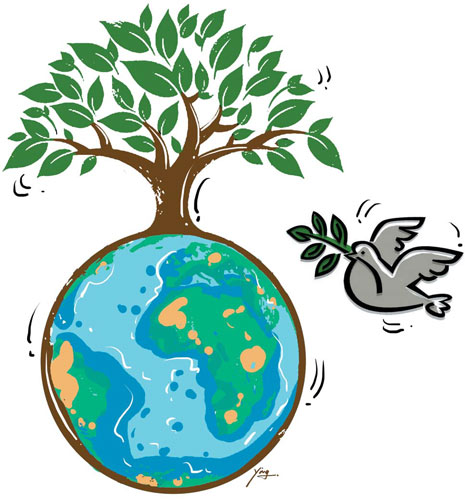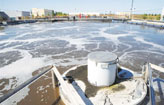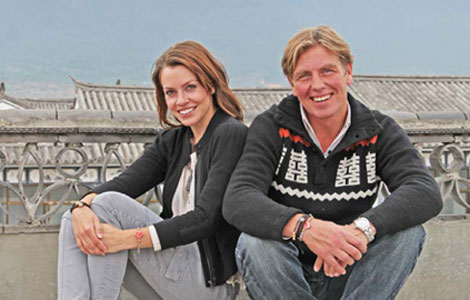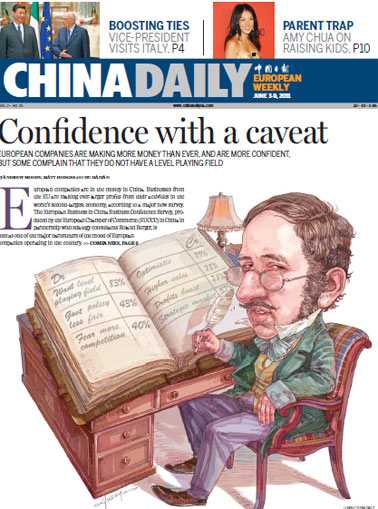Time for EU to turn the tide in its favor
Updated: 2011-06-03 10:52
By Zhang Jian (China Daily European Weekly)
|
 |
The European Union has high stakes in the Middle East and North Africa regions. Its chief policy objective is to ensure peace and stability in the regions and to safeguard the EU's security interests.
Other plans include exporting the EU's ideology and core values, expanding the EU's business interests in the areas and ensuring energy supply from these areas.
Geographically, North Africa and the Middle East regions, particularly the areas close to the European Mediterranean coast, are near a large portion of the EU. Instability in the region as well as issues such as terrorism and immigration directly affect the safety of the EU, especially France, Italy and Spain. On the economic front, North Africa and the Middle East regions are rich in oil and gas, which the EU has been dependent on for a long time.
However, the crisis in Libya and other events in the Middle East have a great impact on the EU.
The EU's Middle East and North Africa strategies will have to shift focus on the building of a civil society and democratic reforms in these regions, on boosting the local social and economic development and trying to revive the Israeli-Palestinian peace talks.
First, the promotion of democracy and the implementation of the political democratic reforms will for the first time become the EU's most important concerns and policy objective in the Middle East and North Africa. The safety concerns, energy security concerns and economic interests of the EU will be a part of this objective.
It should be noted that safety ranks first in EU's foreign policies, followed by democracy.
EU countries adapted their Middle East and North Africa policy over several years. It recognizes and wants to maintain the political status quo in these regions without directly aligning its international engagement and assistance policy with democratic reform and other political reform conditions.
European leaders have relied on figures of power in North Africa and the Middle East, such as Tunisia's former president Ben Ali, Egypt's former leader Hosni Mubarak, Libya's current leader Muammar Gadhafi and others, to safeguard the EU's interests and the security of EU nations.
For example, for fear of violent Islamists and the rise of anti-Western forces in the Middle East and North Africa regions, the EU often took the default position and supported local governments.
Egypt had gained the EU's support since it had supported the Israeli-Palestinian peace talks. In recent years, Italy has dramatically reduced illegal emigration from Africa by reaching agreements with Ali and Gaddafi.
Similarly, for energy and economic interests in those areas, several large French companies in Tunisia had close relationships with Ali's personal business group. Some French political figures also have a close bond with political figures in Tunisia.
It is also well-known that Italian Prime Minister Silvio Berlusconi has a close relationship with Gaddafi. Italy is not only relying on Libya to prevent African illegal emigration, it still has considerable economic interest in Libya's oil as well as arms exports to Libya.
However, with some political figures stepping down in the Middle East and North Africa, European leaders have realized that if the EU wants to maintain influence in the region, it must find new paths and new forms of cooperation. In particular, it must create new partnerships with local politicians and political forces.
German Foreign Minister Guido Westerwelle proposed in March that Germany and Egypt and other countries establish "a partnership for transformation".
"We are ready to stand at the side of the democrats," Westerwelle said. "We are willing to assist them in helping build an independent judiciary, providing advice and counsel wherever requested."
Also in March, the European Commission and the High Representative of the European Union for Foreign and Security Policy jointly released A Partnership for Democracy and Shared Prosperity with the Southern Mediterranean. This document outlines three foundations to build a "democracy and shared prosperity partnership": Democratic transformation, civil society development, and a sustainable, yet inclusive economic and social development.
Based on this document, the EU will be actively involved in the transformation of the Middle East and North Africa regions, exporting European political and economic ideals and values to guide the transition process toward democracy. By doing so, the EU will replace its past over-reliance on local government and diplomatic powers with new ways of "comprehensive engagement" for all sectors. In particular, the EU will promote the development of civil society in North Africa and Middle Eastern countries to foster pro-European forces.
In addition, at the operational level, A Partnership for Democracy and Shared Prosperity with the Southern Mediterranean is incentive-based. For those countries that partake in constitutional reform, judicial reform and conduct fair and open elections, the EU will provide more financial assistance, trade concessions and further relaxation of visas.
Second, the EU will intensify its efforts to stabilize Palestinian-Israeli relations and Arab-Israeli relations to avoid an even greater instability and military conflict in the Middle East and North Africa regions. The Palestinian-Israeli peace issue is not only to the stability of Europe's long-neglected backyard, but also related to the internal security of the EU.
The United Kingdom, in 1917, launched The Balfour Declaration. The document allowed large numbers of European Jews to immigrate to Palestine and established the Trust Territory of the State of Israel. Since then, there has been a long-standing conflict between Palestine and Israel.
The Middle East turbulence has affected the peace talks between the two states. Palestinian-Israeli peace diplomacy has been one of the key priorities in Europe. The Palestinian-Israeli conflict is a long-term insecurity and instability factor for the EU. The conflict has also created a breeding "base" in the Middle East and is the main source of terrorist organizations.
The EU's position toward the Palestinian-Israeli peace issue is not entirely consistent with the position of the United States. The EU tends to take care of the concerns of the Palestinians, encouraging Egypt and other countries to support Palestinian-Israeli peace talks through economic aid and preferential trade, exerting some pressure on Israel.
After the recent changes in the Middle East, the new governments of Egypt and other countries are unlikely to support Israeli-Palestinian peace talks, which will encounter new difficulties.
If the confrontation with Israel and Arab countries increases, possubly leading to the outbreak of a new military conflict, which will further stimulate anti-Western sentiment in the Islamic world, the EU geopolitical security and internal stability will suffer a lot.
According to an analysis by the Pew Research Center released in January, the EU's Muslim population reached 44.1 million in 2010, which accounts for 6 percent of the total European population. This figure is expected to increase in 2030 to 58 million, or 8 percent of the total European population.
Third, the EU will be more concerned about the socio-economic development in the Middle East and North African countries. Those areas provided the EU with a continuing influx of illegal immigrants and the proliferation of extremism and terrorism. These are the fundamental sources of EU's security risks.
After analysis and reflection, the EU began to realize that its input in boosting the economic development was not enough and there is a need for policy adjustments.
Of course, the EU recognizes that the implementation of the policy adjustment is unlikely to happen overnight. First, there is a lack of consensus within the EU member countries. Because of historical, geographical and emotional reasons, the southern countries in the EU, such as France, Italy, Spain and others, proposed that the EU put more energy and money into North Africa and the Middle East, while the Central and Eastern European countries and the Nordic countries did not agree.
Second, there is a wide gap between the EU's ambitions and its actual paying ability. Since the outbreak of the EU's sovereign debt crisis in the past two years, more member countries have tightened fiscal budgets to reduce the deficit.
The Middle East and the North Africa regions are major concerns for the EU. In the short term, change in these regions poses more challenges than opportunities to the EU; in the long term, it also offers an opportunity for the EU - to enhance its own values in the region.
The author is a scholar with the China Institute for Contemporary International Relations.
E-paper

Tapping into the future
Foreign companies are investing in China's water industry as many predict a growing profit margin.
Preview of the coming issue
Headhunters ride on growth
Commercial property rides wave
Specials

Cuisine central
London's Chinatown is helping diners appreciate full palate of Chinese food

Tying the knot
Danish couple's high-end macrame export business takes off in the mountains of Yunnan.

Truly a super woman
Li Yuchun first came to prominence in 2005 as the Super Girl winner, and since then has become an international star.
